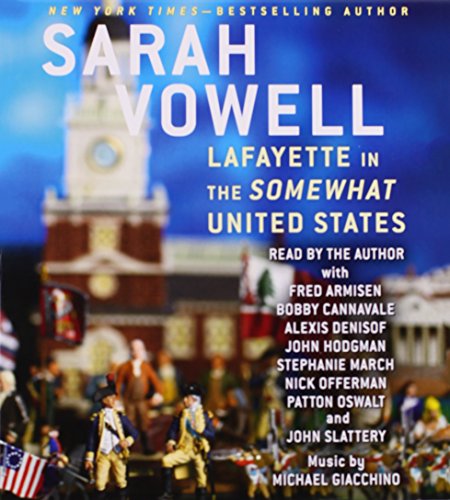
From the bestselling author of Assassination Vacation and Unfamiliar Fishes, a humorous account of the Revolutionary War hero Marquis de Lafayette—the one Frenchman we could all agree on—and an insightful portrait of a nation’s idealism and its reality.
On August 16, 1824, an elderly French gentlemen sailed into New York Harbor and giddy Americans were there to welcome him. Or, rather, to welcome him back. It had been thirty years since the Revolutionary War hero the Marquis de Lafayette had last set foot in the United States, and he was so beloved that 80,000 people showed up to cheer for him. The entire population of New York at the time was 120,000.
Lafayette’s arrival in 1824 coincided with one of the most contentious presidential elections in American history, Congress had just fought its first epic battle over slavery, and the threat of a Civil War loomed. But Lafayette, belonging to neither North nor South, to no political party or faction, was a walking, talking reminder of the sacrifices and bravery of the revolutionary generation and what they wanted this country to be. His return was not just a reunion with his beloved Americans, it was a reunion for Americans with their own astonishing singular past.
Lafayette in the Somewhat United States is a humorous and insightful portrait of the famed Frenchman, the impact he had on our young country, and his ongoing relationship with some of the instrumental Americans of the time, including George Washington, Alexander Hamilton, Thomas Jefferson, and many more.
An Amazon Best Book of October 2015: The Marquis de Lafayette, a.k.a. one of George Washington’s best buds, is the subject of Sarah Vowell’s latest offering, Lafayette in the Somewhat United States. So, why would a young French aristocrat venture to our shores to join Washington’s army and fight in the Revolutionary War? He came for the glory! He came because he believed in American ideals! He came to escape his in-laws! But, mainly it was for the Enlightenment ideas that were unevenly embraced by many of his fellow comrades—ideas that impacted how the war played out. I have seen eyes glaze over when I talk about this sort of thing, but anyone familiar with Vowell’s oeuvre knows what a knack she has for making the (seemingly) mundane fascinating. She also draws some oddly comforting parallels between that time and our own (turns out that politicians have been butting heads, acting like idiots, and sporting terrible comb-overs since the birth of our great nation). There is rarely a description of Vowell that doesn’t include the term “acerbic,” and her signature snark, strategically employed, is one of the things that makes ‘Lafayette’ a fun (and yes, educational) read. But the other quality that shines through is her optimism. You will be smarter and less cynical after reading it. –Erin Kodicek
